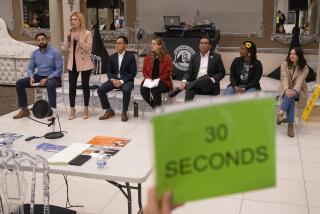MIDEAST : PLO Faction Deluged With Suitors to Fill Slates for 1st Elections : Hundreds of potential candidates with years of service to Fatah have requested backing. Some resort to running as independents.
- Share via
BEIT UMMAR, Israeli-Occupied West Bank — Nabiha abu Rumeilah is the sort of would-be politician who is giving PLO Chairman Yasser Arafat heartburn these days.
Active in the Palestinian women’s movement for more than a decade, Abu Rumeilah, a 38-year-old homemaker and mother of nine, says she is well qualified for election to the Palestinian Council, which is holding its first elections in January.
She says that as a poor woman who grew up in a refugee camp, she feels uniquely able to speak for those on the fringe of Palestinian society. As an active member of Fatah, the largest Palestinian faction, she thought she should get the faction’s backing for her candidacy.
“But they did not even want to acknowledge my existence,” Abu Rumeilah said bitterly during an interview in her two-room cinder-block home near the West Bank town of Hebron. “They said I could not be on the slate.”
So Abu Rumeilah is running as an independent in the Jan. 20 elections, as are dozens of others. The Palestinian Elections Commission says it has been deluged with information requests from would-be candidates.
“The number of potential candidates is huge. There are hundreds in every district,” said Mohammed Shtayyeh, deputy director of the elections commission.
The candidates springing up like mushrooms across the West Bank and Gaza Strip are evidence of the bind that Fatah finds itself in as it puts together slates of candidates for each of 16 electoral districts.
Arafat’s greatest problem is how to pick slates without alienating important clans, activists and political figures. Every Abu Rumeilah running independently represents a failure for the Palestine Liberation Organization chairman.
*
Arafat’s problem can be called an embarrassment of riches. For decades, Fatah urged its supporters to actively oppose Israel’s occupation of the West Bank and Gaza Strip. Thousands of men and women came up through the ranks of trade unions, various social action committees and underground guerrilla cells.
Now many more of those veteran activists believe they deserve a seat on the 82-member Palestinian Council than Fatah can possibly accommodate. Potential candidates are eager to be members of what everyone assumes will be the party with the lion’s share of council seats.
No one doubts that Fatah will dominate the elections. It not only is the largest and best-financed faction, but it also controls the interim self-governing authority--the largest employer in the territories.
Fatah’s chances are helped by the disarray of its political opponents. Hamas, the Islamic militant group that poses the greatest potential threat to Fatah, still has not announced the formation of a political party.
The tiny Communist Party has announced that it will run, but even its leaders say they doubt they will win any seats. Other left-wing parties are boycotting the elections.
*
About 7,000 Palestinian teachers are due to complete their registration of voters across the territories on Saturday. About 1 million people are expected to register, Shtayyeh said.
Intense lobbying is under way within Fatah over the makeup of slates. Women’s organizations demanded that 30% of the council seats be reserved for women, but their demand was rejected.
“We are trying to persuade each party now to establish a quota for women on their slates,” said Ghada Zeidan, a member of the Women’s Affairs Committee that works with the Palestinian Authority on women’s issues.
Women who run as independents are unlikely to get the backing of their families, she explained, “because in a patriarchal society, the big families want to play it safe. If they field a candidate, they will pick a man because a man has a better chance of winning.”
Indeed, Abu Rumeilah has so far been unable to secure the backing of her husband’s large family, the Abu Ayyash clan.
“But I am not going to quit,” she said. “I believe that I have a right to represent women, the poor, the oppressed, the refugees. It should not just be that people from big families or people from powerful parties get elected.”
* RELATED STORY: A17
More to Read
Sign up for Essential California
The most important California stories and recommendations in your inbox every morning.
You may occasionally receive promotional content from the Los Angeles Times.












